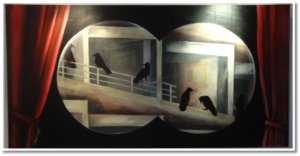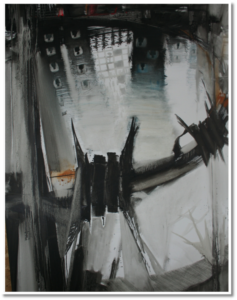DEAD ZONE VERTIGO

Varosha, once a world-class tourist resort, has been a ghost city on the divided island of Cyprus since 1974. It was completely abandoned when years of inter-ethnic violence between Greek-Cypriots and Turkish Cypriots culminated in a coup inspired by Greece’s ruling military junta. Turkey invaded Cyprus and occupied the northern third of the island.
The Varosha quarter lies at the center of Dead Zone Vertigo, a collaboration between Greek-Cypriot painter Andros Efstathiou, American poet Paula Closson Buck, and Turkish-Cypriot painter Ruzen Atakan. Believing in the ability of the imagination to find its way into places where human beings cannot go, together the three spent six months working artistically to bring to life the dead space of Famagusta. Out of the synergy between language and visual image comes their response to the city’s history and its present—by turns elegiac, ironic, despairing and hopeful, but always bearing witness to the troubled negotiation of difference.

Paula Closson Buck
THE KNIGHT’S APOLOGY
When he set out for The Holy Land in 1192, it meant he would defend the destruction he had been about–the raped women and pillaged landscapes. But now, delayed by centuries, his apology means he is, well, sorry. Yes. The knight is sorry for your ancestral hurt. For the dead children. The disemboweled sheep. He’s sorry for all of the busted up mosques and his general insensitivity to the needs of others. He wishes he hadn’t spoiled so many beautiful people and places in order to save them. When the knight set out, to spoil meant to increase one’s possessions. To take what you thought you’d a right to. Now what it means is a dirty shame. When the knight set out, condominium meant Christians and Muslims sharing the island. Equally productive. In the vacant space of their violence toward each other, what do these ruined apartments mean? His own corporation gone bust, the knight is riding back through Famagusta. Disarmed, he’s stalled in the showroom of this postmodern ruin, with the fleet of 1974 Toyotas. He’s trafficking in guilt. And he’s struck by the fondness he feels for people and real estate that once meant so bloody much trouble. What will you do if you see him there–idling, looking for home? Will you remember your own historic indiscretions? Consider the emptiness of these apartments set at a rakish angle to the sea. You decide. Are the shades at the windows returning ghosts, or just what the last person raised or lowered after fleeing or looting the place?
